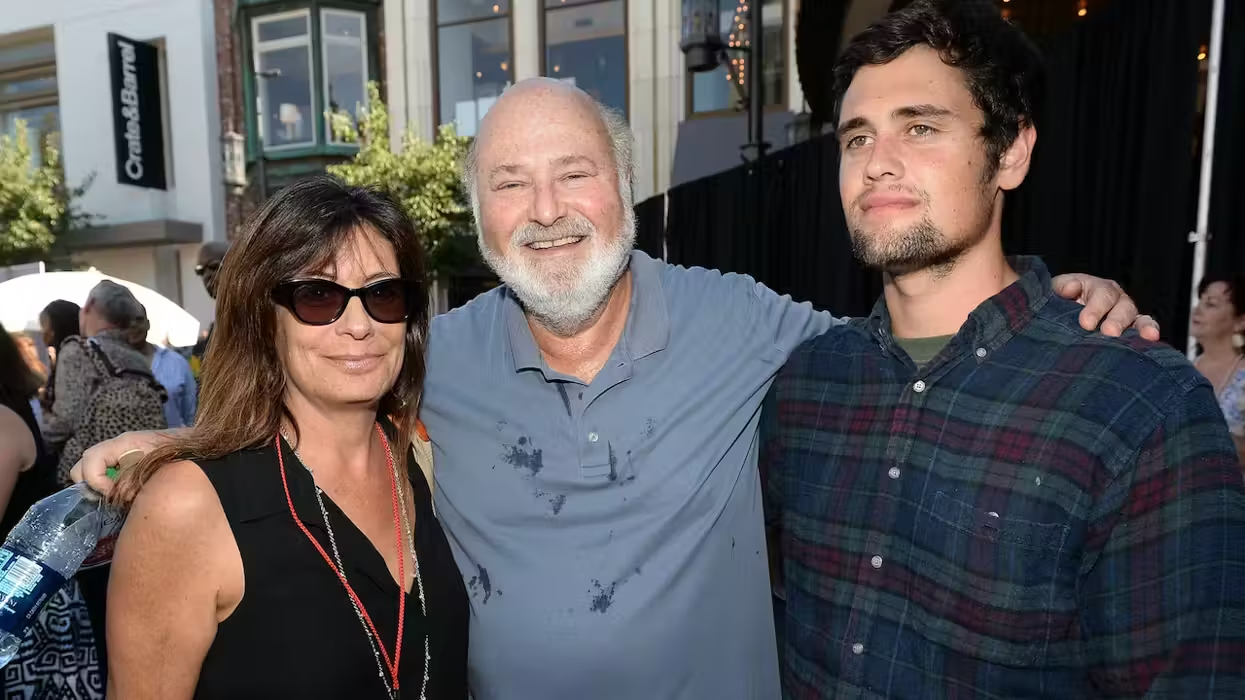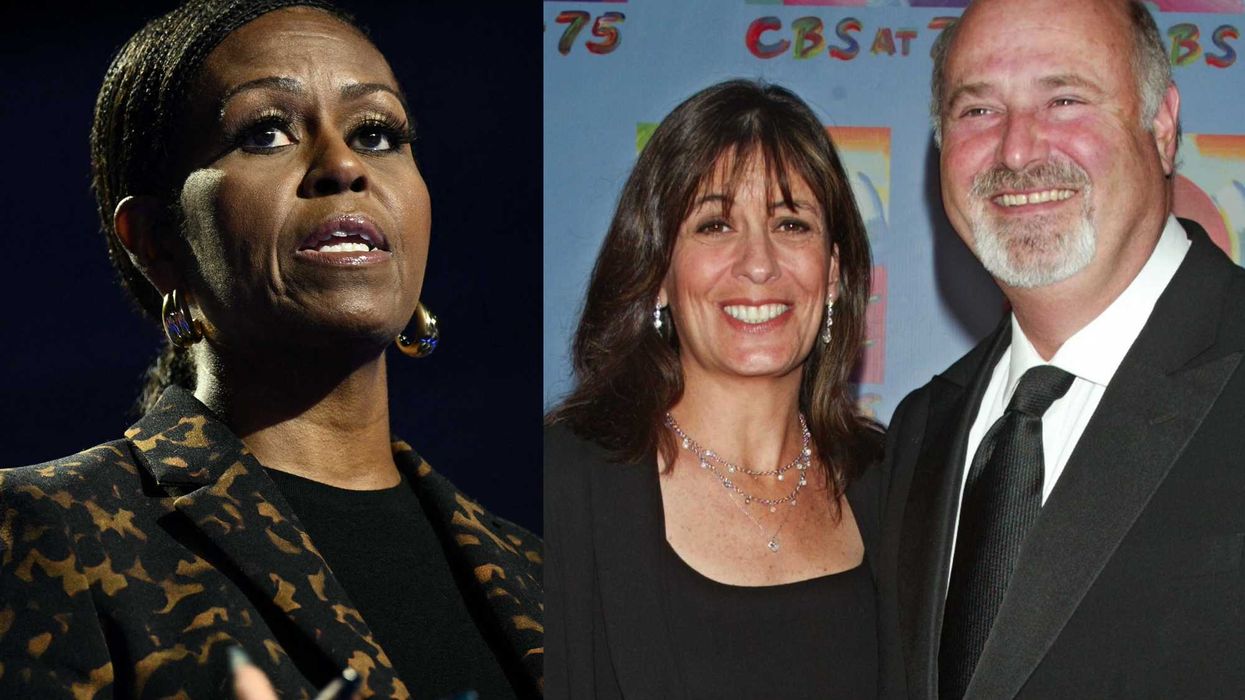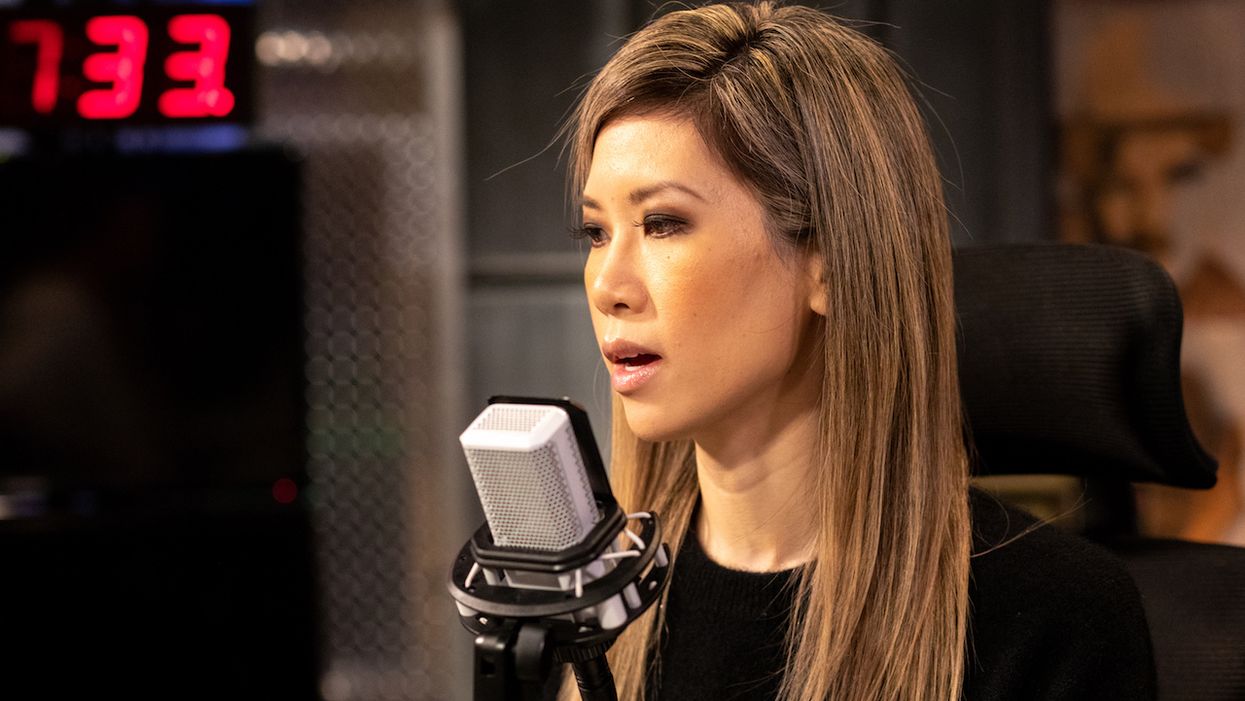
© 2025 Blaze Media LLC. All rights reserved.
Debra Soh has a recurring dream that she's on a rollercoaster, and she can't get off. She doesn't like rollercoasters. She hates them. So the dream has always filled her with unease. But what she's learned to do when she finds herself trapped in a clanking iron seat as it inches up a mechanical hill, toward a freefall, is to give in, to enjoy it, or at least to believe that the plummet won't be so bad.
This attitude has blossomed outward, into her waking life.
"I think in general," she says, "if you experience any discomfort or pain, the only way you can overcome that is to embrace it and say, 'This might be something I don't like, but what is it that I can take from this?'"
A few hours ago she was in Canada; now she's 1,400 miles from home, in Dallas, Texas, at Mercury Studios, for The Glenn Beck Podcast. She is surrounded by cameras and microphones, perched at a wooden table across from Glenn Beck, who just asked her about furries, the subculture of people who dress up as animals, presumably for sexual reasons. Glenn's voice lingers, "Is it a sex thing?"
She pinches the black gemstone of her forefinger ring, then wiggles it down to a riprap of knuckle — lingering, caught in self-interrogation, careful and specific with her answers: Debra Soh is thinking.
The metallic air constrains with a thud of anticipation.
No, she says. It is not about sex, she says. It is about community.
Then she says that the truth matters.
Word is bond for Debrah Soh. As a sexologist, neuroscientist, former academic, journalist, and columnist for Playboy, she is answering the thorniest questions we're all curious to ask but eager to avoid. The ones that make us blush or cringe, the ones about gender and rape and manhood, about wayward feminists and child sex robots.
Before the podcast, in the makeup room, draped into her red vinyl chair, Soh was warm-voiced and kind and sweet. Now, an hour later, she stares ahead through dark eyes and talks with deliberate pauses. Even her vocabulary has shifted. The effortless warmth that lilts at the end of every sentence has been replaced by many-syllabled words spoken in a lower timbre. I'm not calling her disingenuous. The opposite, in fact: Her tone accords to the contextual rigors of her place and setting, an emotional intelligence that feels multilingual.
Behind Soh, the jointed arms of a camera-rig spook up like robotic graveyard willows. A doting forge of halogen yellow shimmers from high-watt lamps, off into Tramadol bright, through air too cold to carry any kind of a scent. It's oddly quiet on Stage 19, which was once used as a film set for "Barney & Friends," the children's show with adults in animal costumes, humans pretending to be a goofy purple dinosaur and his reptilian lackeys. And as Soh lingers in thought, her reticence is haunted by similar goons, who are cloaked instead by generic usernames and anime profile picture. They are hidden everywhere, even here, prowling in the shadows among the ghosts of Barney and Mother Goose and Baby Bop.
The time is 1:00 p.m., but there are no windows here so you wouldn't know it, as Soh shifts her bone-ribboned hands like two feathering wands. She is the only woman in a room full of men, talking about how it's okay for men to be men, saying that women don't want a man who won't be a man.
When she was a child, Soh had gender dysphoria: All her friends were boys. People called her a tomboy. She hated girly clothes and dolls and pink of any kind. She loathed being female. She enjoyed sprinting around the house with a He-Man sword and standing up to pee. Her parents were supportive. They never forced her to be a boy or a girl. They let her dress however she wanted. They let her shave her head. At the time, she was convinced that she'd been born in the wrong body. Then, as a teenager, she gravitated toward feminine clothing, grew her hair out, and carried a purse.
All her life, many of her best friends have been gay. She thinks of herself as having grown up as a straight girl in the gay community. Every June, she went to the Pride Parade with a raucous group. On one of these occasions, well before she'd ever even considered a career as a sexologist, an older gay friend told her: "Don't be ashamed to talk about sex, because there's nothing shameful about it."
On-air, she speaks with the same pointedness you find in her writing. She remains stoic, seemingly unaffected by the near-frost temperature of the studio, while — in reality — she's freezing. Everyone is. Only she's half their size! But, her being a professional, she has figured out exactly where and what the camera frames (from the tabletop up: the rest is hidden). So she clamps her thighs into a black jacket with bright silver zippers, a space heater at her feet. And hides any teeth-chatter or shivering. And rarely speaks in contractions. Preferring to separate one given word from another, so that each sentence is an assembly-line production of vowels, and fricatives, and silence.
She neither smiles nor laughs. But when Glenn asks about brain imaging, one of her areas of expertise, she breaks this stoniness, and her eyes bulge like imperative statements. Without meaning to, she rattles off medical jargon, something about the interstate-like pathways of this or that neural circuit. Glenn wobbles his head and shakes his hand and tells her to slow down and talk normal. A few minutes later, the podcast is over, and the set bustles to a close. Cameras being dismantled, lights unrigged, microphones probed and wires looped into circles.
Soh and I chat in her dressing room. It's mid-October of 2018, and the entire Western world is juiced with the word "Kavanaugh" (as in, Supreme Court nominee Kavanaugh), amid allegations that he sexually assaulted Christine Blasey Ford when she was 15 and he was 17. Everyone must have an opinion about this situation — well, according to Twitter. And every opinion is an act of warfare, something people sacrifice friendships to maintain.
So, of course, the topic of Judge Brett Kavanaugh comes up at different parts of Soh's day, briefly.
But fleeting as it is conversationally, the Kavanaugh question bums around and undergirds the helpless platitudes that transform headline news into public opinion. Kavanaugh's confirmation did a number on the whole country. Doesn't matter who you are or what side of the barbed-wire gate you chose — or even if you shrimped out and played dead like a champ — a conflict of that intensity, as widespread and harsh, will glue itself to your thoughts until the next disaster plows into the nation's consciousness or fury, possibly even longer, and all the time all we want to know is how? and why? Because now more than ever people are desperate with questions. Debra Soh has answers. More important, she says them as a matter of principle.
"Honesty, intellectual honesty, is my most important virtue," she says. "I think being honest with yourself, too, because that's important for personal growth, and in terms of how you interact with other people, and the kind of life that you live."
As a college student, she loved studying the science of sex. Had a path laid out for herself: work as a researcher, then establish her own research lab, then her own research program. But, after more than a decade at university, having finally earned her Ph.D., she was overcome by a discouraging uncertainty about her future.
"I decided that the [academic] climate had changed so much that, for me, it wouldn't have been a rewarding path forward," she says. "I just didn't see the point of myself being in an environment where I couldn't pursue interesting questions."
The decision was by no means impetuous. She rummaged around for months. But it always came back to one thing: she felt threatened. What if she said the wrong thing? Which became, "What is happening that I even have to ask that question?"
In 2014, on a whim, she attended the Furnal Equinox, Canada's largest furry convention, where nearly 1,000 furries had gathered in Toronto. ("When else would I get a chance to meet a bunch of furries?") She wrote about the experience in an academic article titled "A peek inside a furry convention" for the journal "Sexual Behavior." Then "Harper's Magazine" ran it ("Below the Pelt"), and — just like that — Soh had a new career. Since then, it's just been hill work — lots of climbing. Building on her success as a journalist, she and Jonathan Kay created "Wrongspeak," a podcast about "the things we believe to be true but cannot say."
So much of her life has been academic, and her writing has an at-times inflexible scholarly feel that delicately blends into personal stories. Like her Playboy article about her personal history with the gay community, how she writes confessionally, then weaves into an examination of sexologist Ray Blanchard and "his theory of the fraternal birth order effect — the idea that gay men were, on average, more likely than straight men or lesbian women to have a greater number of older brothers." (Blanchard's work inspired Soh to pursue sexology.)
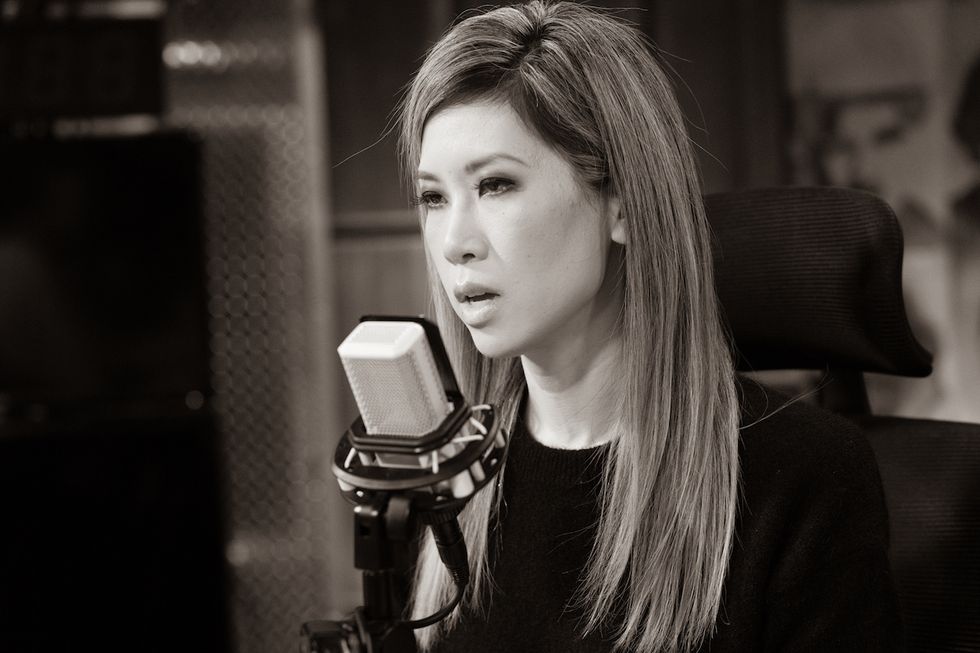
One of her specialties is paraphilia, or "atypical sexual interests" like voyeurism, exhibitionism, and fetishism, which she neatly explains in this animated rundown for Men's Health. She takes a similar approach in "Sex, Gender and Bullshit," a ten-part series by We the Internet TV. Of course, as a sexologist, she faces the inevitable question, the one you're probably thinking, about her own sex life — the awkward, "So you must study all this kinky sex for personal reasons?" People ask her every time. She politely, with humor, tells them that, despite her profession, her sex life could be classified as "vanilla." She leaves it at that.
Because, more than just a sexologist, she serves as a middleman for the rest of us. Like when she explains the difference between sex and gender in one of her Playboy columns:
Biological sex refers to whether we are male or female, based on our reproductive functions and anatomy. Gender is how we feel in relation to our biological sex. For 99 percent of us, our sex and anatomy dictate our gender; they are essentially the same thing.
With this definition, Soh addresses one of the overarching sexual complications of our era: the social environment is steamed, and we don't know about women or men anymore, not like we used to. Much of this is the result of legitimate and meaningful progress. In the last three years alone, the LGBT rights movement has launched millions of Americans straight up Maslow's hierarchy of needs. Human rights. Dignity. But many people, understandably, have been capsized by the pace of it, while also expected to be immediately in agreement with this at-times dauntingly new part of the mainstream. Especially transgenderism. The concept of gender fluidity alone has sent many heads into orbit. Partly because there's an academic tone to much of it that many people aren't used to or don't care for, and perhaps they're more overwhelmed with confusion than steeped in the hostility and bigotry that they are so often, unfairly, accused of.
Soh often jokes that talking about the science of sex should be no more scandalous than charting the dietary habits of geese: No controversy, just facts and data. Because sexology is meant to be a purely scientific study of human sexuality, absent of social issues and policy and theory. Not the case these days, she says, baffled that politics — from the left and the right — have entered sexology to begin with. But while many of Soh's ideas are taboo among the right, e.g. that pornography addiction does not exist and that pedophiles should be treated humanely, conservatives and libertarians have — so far — shown her warmth.
All day today, she's been hesitant to open up, as if afraid she'll misspeak. It becomes clear that the people she's afraid of are trans-activists, who comprise a small portion of the population here in America but whose persistence and conviction have driven the movement into ubiquity. As Soh sees it, while transgender rights have been positive for many people, the activism itself occasionally devolves into the very bullying it claims to oppose. (To be clear, Soh supports the transgender movement, but only when practiced by adults, i.e., surgery and hormone treatment should wait until adulthood, after puberty). Trans-activists have perfected online activism. They gather on Twitter, Reddit, and Tumblr, in niche communities, where they organize group efforts, resulting in the same kind of echo-chamber tribalism that you find among their ideological counterparts, e.g., men's rights activists (MRAs), incels (involuntary celibates), and MGTOWs (Men Going Their Own Way).
The news media support trans-activists far more than their right-leaning opposition — often for good reason — but this can also leave trans-activists unchecked. Which is problematic, given how they fight. They even attack ostensible allies, as seen by their disdain for TERFs (trans-exclusionary radical feminists). TERFs believe that gender is a social construct assigned at birth and used to oppress women. Therefore, they argue, trans women are not in fact women, they are men, and, by dint of insisting otherwise, they are in fact flexing their male privilege over women. Trans-activists consider this belief transphobic and paint TERFs as bigots.
Opinions about trans-activists tend to be more extreme and intense than opinions about other activists. They're seen as heroes by some, tyrants by others. And they fight like they're cornered, with an air of invincibility.
Call it a matter of opinion, but I consider Dave Chappelle the cultural philosopher king of new America, the Voltaire of our time. Nobody owns him. Nobody tells him what to do. He probes America and people respond. He is fair, and sharp, and his comedy defies boundaries: it spares no one. Yet the trans-activists, with the help of journalists, got steamed about Chappelle's transgender jokes in a recent Netflix special: "I support anyone's right to be who they want to be," he said. "My question is: to what extent do I have to participate in your self-image?" Then, on his next special, he doubled down with a marathon of transgender jokes. The retaliatory uproar was loud. "Bigotry + Chappelle" was a popular equation for a veritable flood of salty op-eds and exclamatory tweets.
Soh says that the problem in that situation was activists' inability to shrug off something they're offended by without making a show of their outrage.
Point being, trans-activists have repeatedly confronted Soh on social media and in op-eds, labeling her a concern troll who uses "self-victimization" and catastrophizes their confrontations, which they do not consider harassment. They have accused her of transphobia for a slew of reasons, most recently for discussing rapid-onset gender dysphoria (ROGD), a theory that they consider transphobic. They have called her alt-right, even neo-Nazi, for her interest in the James Damore memo and her criticism of racial quotas at universities. Most of all, though, they hate her stance on gender dysphoria in children.
Specifically, they label her a troll for promoting the "desistance" approach to childhood gender dysphoria, an alternative to increasingly popular two-tier approach, which involves: 1) social transitioning: when a person changes their name and pronouns to fit their gender; and 2) physical transitioning: puberty blockers. (There's a serious debate about whether or not trans-activists actually support hormones and sex reassignment surgery as an option for children.) The 11 studies on desistance near-unanimously concluded that, in most cases, the adults who had had gender dysphoria as a child wound up being gay or bisexual, and happily cisgender, i.e. they no longer felt like they were in the wrong body.
In an article for HuffPost, trans-activist Brynn Tannehill argues that the "desistance narrative is built upon bad statistics, bad science, homophobia and transphobia," adding that the studies themselves are riddled with shoddy work, often the result of cruelty, even mockery, by researchers. She pries apart several of these studies' methodological errors. In 2015, trans-activists led a concerted effort to expose alleged anti-LGBT practices by psychologist Kenneth Zucker, who was in charge of desistance research at the Child and Gender Identity Clinic at CAMH in Toronto. They accused him of conspiring with hate groups to "cure" gay children with conversion therapy, among other things. The hospital fired Zucker and closed the Child and Gender Identity Clinic.
In his article about the convoluted politics of childhood gender dysphoria, Jesse Singal counters each of Tannehill's criticisms:
Every study that has been conducted on [desistance] has found the same thing. At the moment there is strong evidence that even many children with rather severe gender dysphoria will, in the long run, shed it and come to feel comfortable with the bodies they were born with.
Either way, many trans-activists just don't like desistance. Something about the haze of it. Like their reality is being overlooked, because no amount of data could explain how they feel. Transgender people suffer from anxiety and depression at an alarmingly higher rate than the rest of the population, even as children, which can result in self-harm, even suicide. Trans-activists often fault society for locking gender dysphoric children inside a physical reality that they don't belong to. Just as their opponents consider transitioning and non-binary parenting harmful to children, trans-activists see the reverse as destructive.
Soh doesn't buy their argument, says that their intentions are political, adding that she first noticed a frantic cultural shift toward trans-activism in 2015, around the time she wrote "Why transgender kids should wait to transition." She adds that previous data estimated that 3-in-1,000 Americans were transgender, and that that number has doubled in the past decade. "Why is it that every [news] piece is telling parents that every child should transition?" she asks. "It wasn't as mainstream an idea as it is now. Like now, people almost take for granted that if a little kid says that they're the opposite sex, that, 'Of course, you should just let them transition. Tell them, "I love you" and affirm their feelings and help them transition.'"Her tone shifts, lower: "I think many kids are going to be affected by this. We're going to see in 10 years, they are going to be changing their minds."
In a rebuttal to some of Soh's major points, psychologists Lily Durwood and Kristina Olson counter the idea that trans-activists even hold such ideas about gender dysphoric children:
No one in mainstream medicine (or elsewhere, to our knowledge) is performing surgery on or providing hormones to prepubescent transgender children.
Of course, "prepubescent" is relative: some children begin puberty as young as 8 or 9. For Soh, that's still too young for any sort of medical intervention. Either way, she says, adults are enforcing ideology for political reasons. So much so, she says, that scientists, doctors, and mental health officials increasingly avoid the topic altogether. But she hasn't shied away, and she hasn't given up: "I try to be optimistic and think that we'll come back from it," she says. "That science will prevail, that reason will prevail. But it seems like, every day, every week, there's more and more misinformation moving us in the wrong direction. People almost take for granted that if a little kid says that they're the opposite sex, that, 'Of course, you should just let them transition.' But even if a kid says they want to be the opposite sex, why are we taking them at face-value? Kids say all kinds of things. Adults should be more responsible."
Here's a quote from a trans-activist, whose blog includes a three-part series titled "Debra Soh is really bad at trans science":
Nearly all anti-trans scientific claims are unsound, outright false, or plainly misleading, including those made by the foremost voices of public transphobia.
This absolutist rhetoric makes it nearly impossible for anyone to challenge trans-activists (critics of any kind are seen as "the foremost voices of public transphobia"). By traditional standards, such an approach would be considered fallacious, then discarded as nonsense. But "tradition" is one of the concepts that trans-activists are confronting. They tend not to see their rhetoric as filled with ad hominem attacks, but as truthful, justified an appropriate response to rhetoric that they consider bigoted and transphobic.
The whole thing is so damn confusing! Like a tug-of-war, and we onlookers become the little flag in the middle. How can two groups of people be so certain that they are right and their enemy is wrong? Where's the line between legitimate criticism and bullying, when discussing transgenderism? Are social media platforms and news media unreasonably biased in support of trans-activists? Or do trans people face so much vitriol that they need extra protection? Who's actually the intolerant or regressive one? Which side is the aggressor? Who's the victim? Who do we believe? And who actually has the power? How reasonable are trans-activists' expectations of the general public concerning pronoun usage, "dead-naming," and, the real tricky one: whether or not it is transphobic for a cisgendered straight person not to be attracted to someone who has transitioned to the opposite sex? And does policy that supports these expectations violate the rights of anyone who disagrees? Even the basics are uncertain. Should our understanding of gender be social? Or biological? Is sexuality a social construct or a genetic reality? Are trans-activists actually stifling scientific advancement? Or are scientists' views on transgenderism actually outdated, bigoted, and fascistic? In other words, sex and gender have become more than just sex for many people. Now, it's about identity.
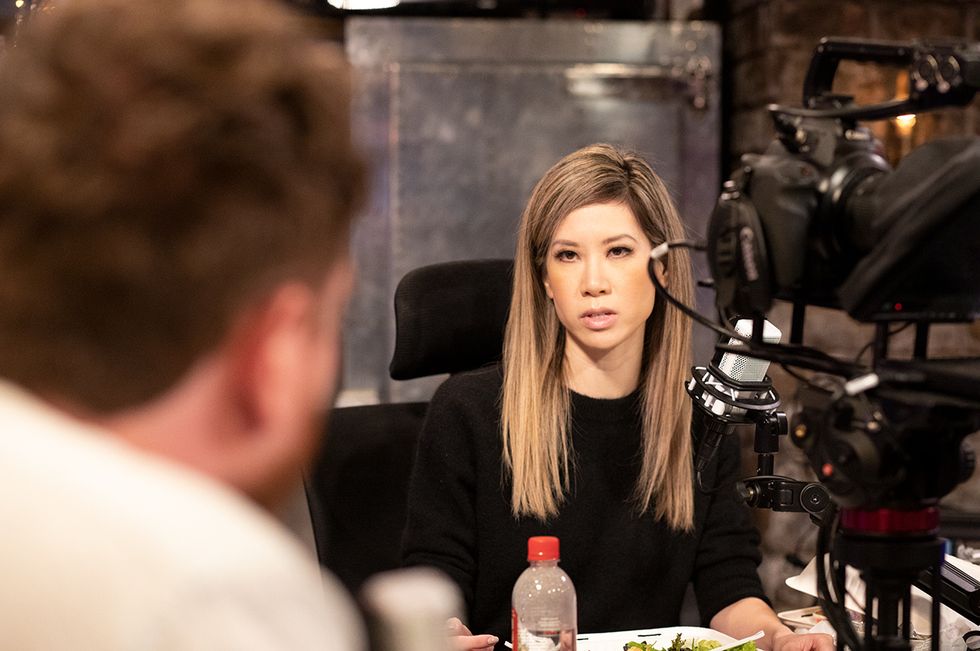
Soft-voiced, "Why is it nowadays that there are so many things that have been deemed harmful or dangerous that we can't say or think them, even though they're true?" asks Soh. "I don't think this is a good way to live. And our culture is a mess right now. But I do hope it's going to come back to the middle. Because it always goes really far in one direction and then it slowly comes back."
This is the credo of the so-called Intellectual Dark Web — Dave Rubin, Christina Hoff Sommers, Jordan Peterson, Gad Saad, Joe Rogan, and, now, Debra Soh.
"[IDW members are] portrayed by journalists like they're awful, demonic people," she says. "And then when I meet them and talk to them, they're so genuinely kind. But that narrative is the reference point where most people are coming from."
A few months ago she spent three hours on "The Joe Rogan Experience."
"Rogan does the long-form interview because he wants to see, 'Do you actually know what you're talking about?'" she says.
"Because it is easy for people to spout these platitudes, or to memorize what they are supposed to say. And then if you prod them and say, 'Well why do you think that? What is your evidence for that?' it usually it stops there. Especially in a three-hour interview. Eventually, what you really think and who you really are start to come out."
As is the case with many of Rogan's guests, Soh has become politically homeless. She finds it surreal, the way her career keeps playing out. But, really, it is a sign of the times. Soh is a sign of the times.
* * *
She glances down at her watch's large, manly, statuesque face. Today has been all haste and timeline. A mechanical stride to it, careening from one motion-picture scene to another, onto the next full-scale stage with all new furniture and backdrops. She saunters to the Stage 3 for "The News and Why It Matters." Earlier, a few hours ago — an amount of time that seems impossible, given all that Soh has accomplished today—the studio was a cold, cold place, a few degrees from your breath in the air. Warmer, now. Maybe too warm — ah, jeez, too warm for sure — and behind the plywood walls, off-set, myself and a few others hide, sweating and vying for the chair under the A.C.'s jet stream.
The pine aroma of the set powders the nose. Forest-like, with hints of spray-paint and industrial glue. From the other side of the wall, the set appears to be a winter cabin. The way the elaborate panels and the roaring taxidermied bear seem real, and mechanical sounds whir like a thunderstorm and the floor has been stomped on for years, painted so many times that its edges look like gorgeous stones covered in minerals and pastel-tinted crystals. Backstep a few feet and the curtain shoots up. At the edge of snares and wire. Metal walkways four stories high. Risers, props — and every heavy thing has wheels. Everybody quiet at the same time, with the countdown for the show: five, four, three, two, and the silent one.
Under the cannonballs of stage-light, the show scoots to life.
Soh starts by saying that she's a liberal, but what does that even mean anymore? She has other elegant things to say, quietly. Behind the set, the control panel spurs with so many screens, each yawning into a different vision of the program. A few of us gaze at the show as it's being played out on tiny monitors, none of which emit sound, but we hear every on-screen person speaking because we're all in the same room.
At one point, maybe off-air, they start talking about sex robots and how, rumor is, there's going to be a robot brothel in Houston. Someone says that we better be careful: If the robots gain consciousness they're not gonna like being raped and abused. Someone else says that machines are just machines.
Strange future either way. But it's happening, and, oddly, the possibility of robot prostitutes signifies a masterful, nuanced eruption of human advancement. Because over the past twenty years, we have witnessed a rare event in human history. A monumental transformation last seen during the Industrial Revolution, when people's conception of the world — everything they knew — shifted. Our idea of life as part of a world designed and guided by God was stamped out by factories, motors, and interchangeable parts. Suddenly, the world had gears, steam, and corrupted air that billowed from smokestacks. People clustered nearer to each other, gawking as machinery rose up all around them. They were the creators, and their metal inventions were proof that they had become a new kind of God.
Similarly, now, we are realizing for the first time that we no longer belong to a mere world; we belong to a universe. And our understanding of this universe — everything we know — has shifted from the idea of the world as a machine, to the universe as a network: Boundless, infinite, uncaring, incomprehensible. It turns out that we, regardless of any inventions we claim, are the finite, mechanical contraptions, patterned by the unknowable, God-like network that always outlives us.
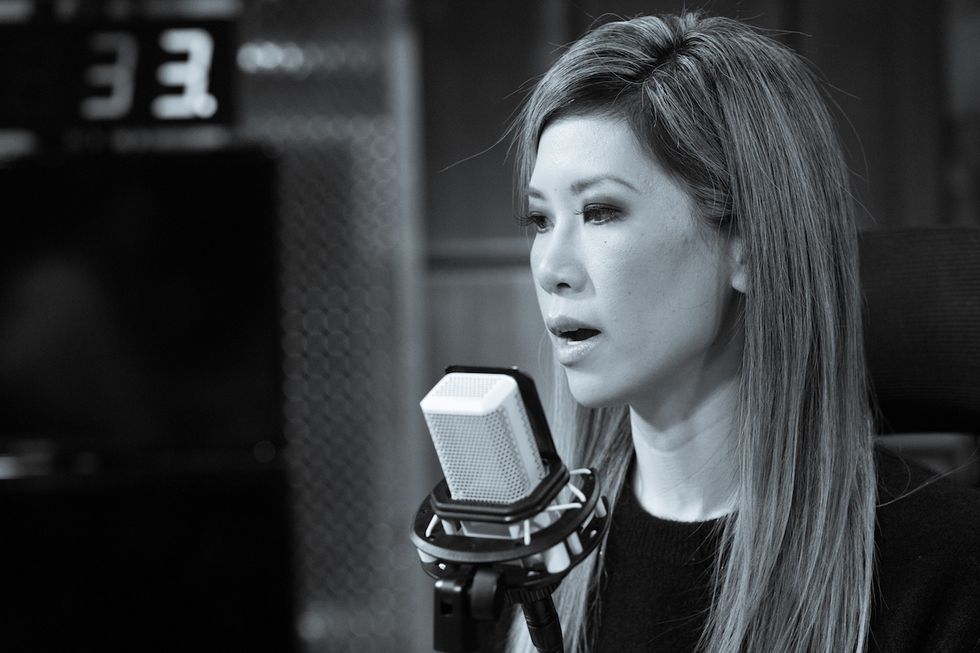
As soon as the show finishes, Soh trods back out through the swinging doors. As usual, the 75-foot-tall midway of Mercury Studios bustles with activity, always someone dashing from one studio to another, headsets on or thumbing at clipboards. Amid the chaos, Soh remains calm. All black clothing and twinkle-red stilettos, streaks of blonde down her shoulder-length hair. She peeks at the original Darth Vader mask in Glenn's office, curving her finger into her chin as she stares, then says, "Until recently, I had considered myself a feminist."
She wavers between the Darth Vader mask and the crowd of models down the hall, in an independent studio not affiliated with BlazeTV, as part of some photoshoot. A horror magazine, supposedly, and they are dressed in provocative costumes — one minute it's a lizard, the next minute it's Mrs. Claus, then a superhero or a jailbird in a shredded prison mini-dress. Tall, Amazonian women, who strut like they're on a platform. Early-to-mid 20s, but hard to tell with their Pharaoh-mask of makeup. They lurk into the studio for a while, then emerge an hour or so later to wander the hallway looking hungry and bored as Soh talks about the pitfalls of feminism in the #MeToo era.
"At the core it had some good points," she says. "More recently, I think it does a disservice to women because it's teaching women to believe things about men and women that are not based in reality. I think most rational women have distanced themselves from feminism, because it stands for things that most rational women are not going to be okay with."
In print, that quote reads harsh and a little arrogant. But the way she says it — it's like she is secretly heartbroken that a good friend abandoned her, and she misses her home. She says that, to succeed, feminism must embrace science. Then she waves her hand at an imaginary thing, at the invisible outline of feminism, as if asking it to please come back, and a woman in cheetah lingerie stares.
It's 4:15 p.m.; one last interview; in the radio studio. Since arriving here at 11:00 this morning, Soh has launched from one commotion to the next. By her own observation — about how Joe Rogan's marathon interviews reveal who the person actually is — any of her defenses are now down, cramped to a halt by fatigue, and this is Debra Soh at her realest. She is kind, and funny, and she spills lettuce from her salad as we talk.
Her voice tilts upward at the end of each sentence. Hulking over her, a massive camera strapped into a rail like a mechanical rabbit at a Greyhound race, and it suddenly — loudly — violently — thrashes to motion and starts groaning and spinning and flashing and shifting along a rail. Is it launching? Taking flight? It startles all of us and, for a moment, we stare horrifically at the animatronic life-form having a conniption fit, some weird machine with a mind of its own, a tiny black pontoon on a trapeze railway, careening upward always.
Then the little robot falls back to sleep.
"I used to be intimidated by controversial ideas," she says. "When I first started writing, I always worried about what people would think. Now, I'm not okay to stay quiet. If I don't agree with something, I can't keep my mouth shut."
Above all else, she believes in empathy, believes that people are empathic. She says she constantly asks herself, "Am I doing enough?" As in, is she doing enough to effect the change she wants to see, despite any risks?
As a teenager, she loved punk music. In her studded denim jacket and her blue mohawk, she felt alive at punk shows. The way violence always lingered, in the mosh pits and the stagedives and the motoring drumbeats. Yet, the moment someone fell down, the instant someone lost balance or got hurt, everybody stopped to make sure they were OK.
Want to leave a tip?
We answer to you. Help keep our content free of advertisers and big tech censorship by leaving a tip today.
Want to join the conversation?
Already a subscriber?
Staff Writer
Kevin Ryan is a staff writer for Blaze News.
The_Kevin_Ryan
more stories
Sign up for the Blaze newsletter
By signing up, you agree to our Privacy Policy and Terms of Use, and agree to receive content that may sometimes include advertisements. You may opt out at any time.
Related Content
© 2025 Blaze Media LLC. All rights reserved.
Get the stories that matter most delivered directly to your inbox.
By signing up, you agree to our Privacy Policy and Terms of Use, and agree to receive content that may sometimes include advertisements. You may opt out at any time.




